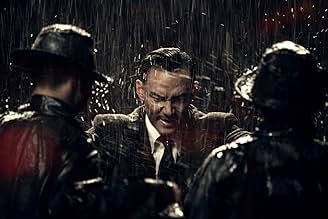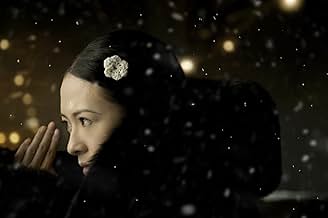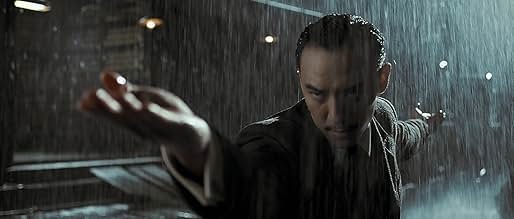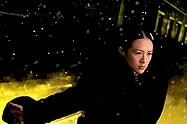The story of martial-arts master Ip Man, the man who trained Bruce Lee.The story of martial-arts master Ip Man, the man who trained Bruce Lee.The story of martial-arts master Ip Man, the man who trained Bruce Lee.
- Nominated for 2 Oscars
- 68 wins & 72 nominations total
Tony Leung Chiu-wai
- Ip Man
- (as Tony Leung)
Elvis Tsui
- Mr. Hung
- (as Jinjiang Xu)
Song Hye-kyo
- Zhang Yongcheng
- (as Hye-kyo Song)
Kar-Yung Lau
- Master Yong
- (as Chia Yung Liu)
Chi Wah Ling
- Foshan Martial Artist
- (as Tony Ling)
Storyline
Did you know
- TriviaThe project was announced almost 10 years before its final release, due to director Kar-Wai Wong's endless perfectionism. Several other motion pictures about the Ip Man that were conceived after this announcement (most famously Ip Man (2008) and Ip Man 2 (2010)) were all released in the meantime.
- Alternate versionsThe original version released in Asia removes a portion of Yi Xintian's subplot. The rain fight sequence between Xintian and Ip Man shown in the trailer, for example, was removed. However, Wong Karwai then recut the movie for a special Berlin Film Festival screening by incorporating the missing scenes back, but editing out several scenes from the original version including a fight sequence between Ip Man and a Hong Kong challenger. Both versions are missing crucial segments that made all three main characters' journey feel incomplete. The actual finished movie was rumored to be 4 hours long. Wong Karwai mentioned he had no intention of releasing the 4 hour version.
- ConnectionsFeatured in The Oscars (2014)
Featured review
"Don't tell me how good your skills are, how brilliant your master is and how profound your school is. Kung fu - two words - one horizontal, one vertical. If you're wrong, you'll be left lying down. If you're right, you're left standing. And only the ones who are standing have the right to talk."
For all intents and purposes, the film began as a biopic of one man – to be more specific, Ip Man, the influential kung-fu master who was instrumental in spreading the Wing Chun style around the world and who was perhaps better known for being Bruce Lee's master. But in the midst of exploring Ip Man's life, Wong must have been suddenly struck by the thought - What exactly makes Ip Man so special? Or even better, why should a movie set in the golden age of martial arts be solely about one grandmaster?
And so, despite Leung's omniscient voice-over, 'The Grandmaster' is in fact not about Ip Man alone. Be warned therefore, if you are expecting a movie focused on Ip Man, because you're likely to be sorely disappointed – as Tony Leung reportedly is – that you're likely to know more about the Man from the Donnie Yen films.
Indeed, the narrative is the film's biggest handicap, though to be fair, it only becomes apparent later on. The first half-hour begins strongly with a rightful focus on Ip, and key highlights include his initiation into martial arts by his master Chen Heshun (Yuen Woo-Ping) and his loving marriage to Zhang Yongcheng (Song Hye-kyo). Ip's first challenge would come with the arrival of Gong Yutian (Wang Qingxiang), a venerable kung fu master from northeastern China looking to consolidate his power in the southeast even as he retires.
After Ip goes on to win the battle of minds with Gong, the latter's daughter Gong Er (Zhang Ziyi) stands up to challenge Ip yet again in a bid to restore her family's reputation. That duel also marks a turning point for the movie, which shifts away from Ip and explores the vendetta that ensues between Gong Er and her father's power-hungry protégé Ma San (Zhang Jin) against the backdrop of the Japanese occupation of China.
Against the better advice of her elders, she forsakes her betrothal to avenge the death of her father at Ma San's hands, which culminates in a thrilling battle set at an old railway station in Hong Kong one New Year's Eve. Where is Ip Man's involvement in all this? Admittedly there is little.
Though Wong does bring Ip back into the picture towards the end of the film, his audience is likely to have grown too emotionally detached from the character. A scene towards the end that portrays supposedly the last time Ip met Gong Er is infused with the director's signature sense of longing and regret as the latter reveals her feelings for the former, but how that bears relevance to what Wong is trying to say about Ip or Gong Er's tumultuous lives is too obscure.
In fact, throughout the film, Wong offers little insight into the person of Ip Man. What might have been a meaningful portrait of his relationship with Yongcheng is lost when the latter is practically forgotten in the second half of the movie. We learn little too of Ip's relocation to Hong Kong, and how he built up his reputable school for Wing Chun. All things considered, a more coherent portrait of Gong Er actually emerges from the movie.
Rather than regard it as a Ip Man biopic therefore you'll be better off seeing it as Wong's philosophical musings on martial artists. Fans of the auteur will recognise these familiar themes from his previous works, but Wong's treatment is still unparalleled in conveying regret, longing, and unspoken desires – whether is it Ip Man and Gong Er's mutual affection for each other, or Gong Er's lament for a life less fully lived.
Le Sourd's visuals are also particularly ravishing in the action sequences, designed with much imagination and flair by veteran choreographer Yuen Woo-Ping. The opening sequence that sees Ip Man take on a whole gang of men along a rain-soaked street is filmed with utmost clarity on the beauty and precision of the moves, with the subsequent duels between Ip Man and Gong Yutian as well as Gong Er equally breathtaking to behold.
Keenly aware of the actors' limitations, Yuen goes for elegance over spectacle. Nonetheless, both Tony Leung and Zhang Ziyi also perform impressively given their lack of a martial arts background, the months of training to get them prepared physically for their respective roles paying off in the grace and confidence by which they execute their moves.
Nonetheless, Zhang easily trounces Leung in the film's dramatic scenes, the former's combination of grit and vulnerability making Gong Er a more compelling figure than Ip Man. The fault of course isn't Leung's alone, as his usual penchant for nuance and understatement unfortunately working against his portrayal in a narrative that pretty much relegates his character's account as a marker of the passage of time.
Of course, narrative was never a strong suite in Wong's films, which typically were mood pieces boosted by his signature artistic flourishes. These trademarks are still very much alive in 'The Grandmaster', which is easily one of the most beautiful kung fu movies ever made. But plot plays a much more important role here than in Wong's other films, since it is ultimately through Ip Man's experiences in life that we come to understand his deeper introspections. This is where Wong's film stumbles, relegating Ip Man to a sideshow instead of placing him front and centre – and given all that hype and expectation of Wong's Ip Man biopic, the cut we see here can only be regarded as a disappointment.
For all intents and purposes, the film began as a biopic of one man – to be more specific, Ip Man, the influential kung-fu master who was instrumental in spreading the Wing Chun style around the world and who was perhaps better known for being Bruce Lee's master. But in the midst of exploring Ip Man's life, Wong must have been suddenly struck by the thought - What exactly makes Ip Man so special? Or even better, why should a movie set in the golden age of martial arts be solely about one grandmaster?
And so, despite Leung's omniscient voice-over, 'The Grandmaster' is in fact not about Ip Man alone. Be warned therefore, if you are expecting a movie focused on Ip Man, because you're likely to be sorely disappointed – as Tony Leung reportedly is – that you're likely to know more about the Man from the Donnie Yen films.
Indeed, the narrative is the film's biggest handicap, though to be fair, it only becomes apparent later on. The first half-hour begins strongly with a rightful focus on Ip, and key highlights include his initiation into martial arts by his master Chen Heshun (Yuen Woo-Ping) and his loving marriage to Zhang Yongcheng (Song Hye-kyo). Ip's first challenge would come with the arrival of Gong Yutian (Wang Qingxiang), a venerable kung fu master from northeastern China looking to consolidate his power in the southeast even as he retires.
After Ip goes on to win the battle of minds with Gong, the latter's daughter Gong Er (Zhang Ziyi) stands up to challenge Ip yet again in a bid to restore her family's reputation. That duel also marks a turning point for the movie, which shifts away from Ip and explores the vendetta that ensues between Gong Er and her father's power-hungry protégé Ma San (Zhang Jin) against the backdrop of the Japanese occupation of China.
Against the better advice of her elders, she forsakes her betrothal to avenge the death of her father at Ma San's hands, which culminates in a thrilling battle set at an old railway station in Hong Kong one New Year's Eve. Where is Ip Man's involvement in all this? Admittedly there is little.
Though Wong does bring Ip back into the picture towards the end of the film, his audience is likely to have grown too emotionally detached from the character. A scene towards the end that portrays supposedly the last time Ip met Gong Er is infused with the director's signature sense of longing and regret as the latter reveals her feelings for the former, but how that bears relevance to what Wong is trying to say about Ip or Gong Er's tumultuous lives is too obscure.
In fact, throughout the film, Wong offers little insight into the person of Ip Man. What might have been a meaningful portrait of his relationship with Yongcheng is lost when the latter is practically forgotten in the second half of the movie. We learn little too of Ip's relocation to Hong Kong, and how he built up his reputable school for Wing Chun. All things considered, a more coherent portrait of Gong Er actually emerges from the movie.
Rather than regard it as a Ip Man biopic therefore you'll be better off seeing it as Wong's philosophical musings on martial artists. Fans of the auteur will recognise these familiar themes from his previous works, but Wong's treatment is still unparalleled in conveying regret, longing, and unspoken desires – whether is it Ip Man and Gong Er's mutual affection for each other, or Gong Er's lament for a life less fully lived.
Le Sourd's visuals are also particularly ravishing in the action sequences, designed with much imagination and flair by veteran choreographer Yuen Woo-Ping. The opening sequence that sees Ip Man take on a whole gang of men along a rain-soaked street is filmed with utmost clarity on the beauty and precision of the moves, with the subsequent duels between Ip Man and Gong Yutian as well as Gong Er equally breathtaking to behold.
Keenly aware of the actors' limitations, Yuen goes for elegance over spectacle. Nonetheless, both Tony Leung and Zhang Ziyi also perform impressively given their lack of a martial arts background, the months of training to get them prepared physically for their respective roles paying off in the grace and confidence by which they execute their moves.
Nonetheless, Zhang easily trounces Leung in the film's dramatic scenes, the former's combination of grit and vulnerability making Gong Er a more compelling figure than Ip Man. The fault of course isn't Leung's alone, as his usual penchant for nuance and understatement unfortunately working against his portrayal in a narrative that pretty much relegates his character's account as a marker of the passage of time.
Of course, narrative was never a strong suite in Wong's films, which typically were mood pieces boosted by his signature artistic flourishes. These trademarks are still very much alive in 'The Grandmaster', which is easily one of the most beautiful kung fu movies ever made. But plot plays a much more important role here than in Wong's other films, since it is ultimately through Ip Man's experiences in life that we come to understand his deeper introspections. This is where Wong's film stumbles, relegating Ip Man to a sideshow instead of placing him front and centre – and given all that hype and expectation of Wong's Ip Man biopic, the cut we see here can only be regarded as a disappointment.
- moviexclusive
- Jan 17, 2013
- Permalink
- How long is The Grandmaster?Powered by Alexa
Details
- Release date
- Countries of origin
- Official sites
- Languages
- Also known as
- Nhất Đại Tông Sư
- Filming locations
- Production companies
- See more company credits at IMDbPro
Box office
- Budget
- $38,600,000 (estimated)
- Gross US & Canada
- $6,594,959
- Opening weekend US & Canada
- $132,617
- Aug 25, 2013
- Gross worldwide
- $73,933,255
- Runtime2 hours 10 minutes
- Color
- Sound mix
- Aspect ratio
- 2.35 : 1
Contribute to this page
Suggest an edit or add missing content






































